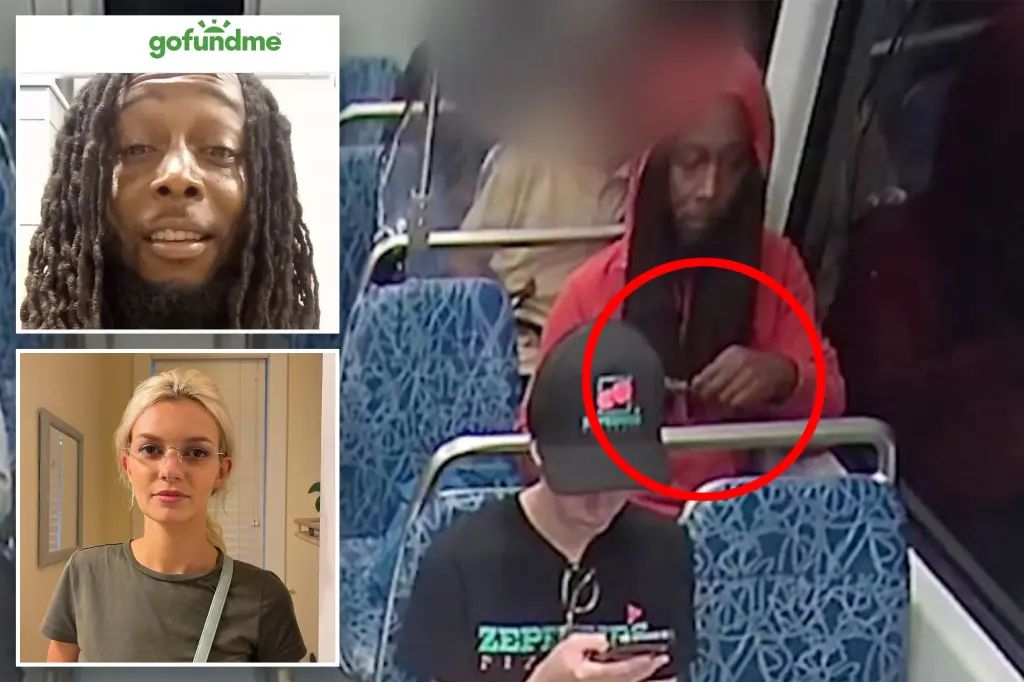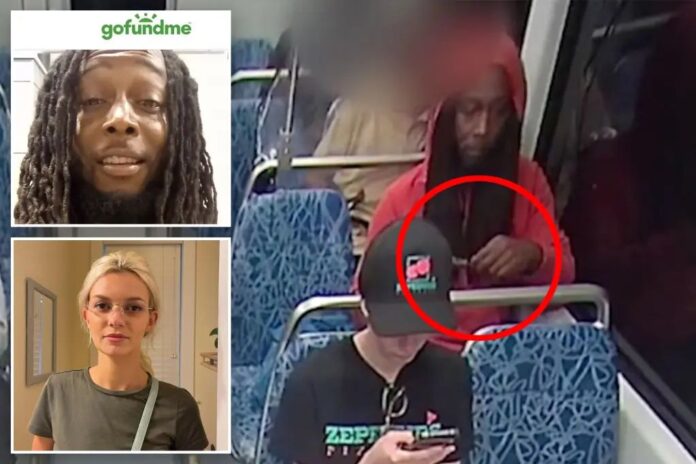A Heartbreaking Crime and a Shocking Twist!
A young Ukrainian refugee escaped war for a new life in America, only to meet a tragic end on a Charlotte train. 😢 But what’s even more unbelievable? Fundraisers popped up to support the man accused of her m*rder—a career criminal with a dark past. Why did GoFundMe shut them down? What did these campaigns claim about “justice”? The story is as infuriating as it is heartbreaking. Tap the link to uncover the chilling details. 👉

On August 22, 2025, the Lynx Blue Line train in Charlotte, North Carolina, became the scene of a tragedy that would shock a nation already grappling with issues of crime and safety. Iryna Zarutska, a 23-year-old Ukrainian refugee who had fled her war-torn homeland for a fresh start in the United States, was brutally stabbed to death while riding the light rail. The suspect, 34-year-old Decarlos Brown Jr., a homeless man with a lengthy criminal record, was arrested and charged with first-degree murder. But what unfolded next ignited a firestorm of outrage: crowdfunding campaigns on GoFundMe were launched to support Brown’s legal defense, claiming he was a victim of a “broken” and “racist” judicial system. The backlash was swift, and GoFundMe removed the fundraisers, but not before they sparked a heated debate about justice, morality, and the role of online platforms in high-profile criminal cases.
An online fundraiser was launched for suspect Decarlos Brown Jr.
The Crime: A Senseless Act on Public Transit
It was just after 9:45 p.m. when Iryna Zarutska boarded the Lynx Blue Line at the East/West Boulevard station in Charlotte’s South End. Wearing her pizzeria uniform, she sat down, scrolling through her phone, unaware of the man in a red hoodie seated behind her. Surveillance footage, later released by the Charlotte Area Transit System (CATS), captured the chilling moments before the attack. According to court documents, Decarlos Brown Jr. pulled a folding knife from his pocket, paused, and then stabbed Zarutska multiple times, including a fatal blow to her neck. As she collapsed, clutching her throat, Brown walked calmly to the train’s door, removed his sweatshirt, and stepped off at the next stop, leaving a blood-soaked carriage behind.
Iryna Zarutska was murdered on a North Carolina train.
Zarutska, who had arrived in the U.S. in 2022 seeking safety from the war in Ukraine, was pronounced dead at the scene. Her death sent shockwaves through Charlotte, a city already grappling with rising concerns about public safety. The Charlotte-Mecklenburg Police Department arrested Brown on August 28, and he was charged with first-degree murder. He is currently being held without bond, with a competency evaluation ordered for his upcoming trial, as reported by WBTV.
Brown’s criminal history, spanning over a decade, includes at least 14 arrests for offenses ranging from felony larceny and robbery with a dangerous weapon to assault and misuse of the 911 system. In 2015, he was convicted of robbery with a dangerous weapon and served over six years in prison, released in 2020. His parole ended in 2021, but recent charges, including communicating threats, suggest a pattern of recidivism. This background only fueled public outrage when fundraisers emerged to support him.
Stabbing victim Iryna Zarutska in an undated photo on social media. She was stabbed on a train in North Carolina.Instagram/ Iryna Zarutska
The Fundraisers: A Provocative Claim
In the days following Brown’s arrest, several GoFundMe campaigns appeared, seeking funds for his legal defense. The pages, which were quickly screenshotted and shared across social media, made bold claims. One fundraiser stated, “While what happened on the Blue Line was a tragedy, what we mustn’t lose sight of is the fact that Decarlos Brown Jr. was failed categorically by the judicial system and the mental health services of North Carolina, and as such is not entirely to blame for what happened.” Another went further, asserting that donations would help “fight against the racism and bias against our people” and “push against this corrupt narrative.”
These statements sparked immediate fury. Social media platforms, particularly X, erupted with comments condemning the campaigns. “You can’t make this up. He [allegedly] murdered in cold blood and yet his supporters want you to think he was ‘failed’ by the system,” one user posted. Another wrote, “Anyone who donated to the GoFundMe for Decarlos Dejuan Brown should be named and shamed!” The outrage was palpable, with many arguing that the fundraisers disrespected Zarutska’s memory and trivialized her tragic death.
GoFundMe acted swiftly, removing the campaigns within hours of them being flagged. In a statement to Newsweek, a spokesperson clarified, “GoFundMe’s Terms of Service explicitly prohibit fundraisers that raise money for the legal defense of anyone formally charged with an alleged violent crime. Consistent with this long-standing policy, the fundraisers have been removed from the platform, and the donors who contributed have been fully refunded.” The platform’s proactive monitoring and rapid response underscored its commitment to enforcing its policies, but the incident raised questions about how such campaigns were approved in the first place.
Ukrainian refugee Iryna Zarutska fled her home due to the war.Instagram/ Iryna Zarutska
A Community in Mourning: Iryna’s Story
While the controversy over Brown’s fundraisers dominated headlines, another GoFundMe campaign quietly gained traction—one for Iryna Zarutska’s family. Launched on August 24 by a family friend on behalf of Zarutska’s aunt, Valeria, the fundraiser described Iryna as a young woman full of hope, seeking a new beginning after escaping Ukraine’s war. “Ira’s life was cut short far too soon,” the page read. “This is an irreparable loss for her family.” By September 9, 2025, the campaign had raised over $80,000, reflecting an outpouring of support from a community horrified by her death.
GoFundMe pages were set up for suspect Decarlos Brown Jr.
Charlotte Mayor Vi Lyles, a Democrat, addressed the tragedy on X, urging restraint in sharing the surveillance footage out of respect for Zarutska’s family. “This was a senseless and tragic loss,” she wrote. “My prayers remain with her loved ones as they continue to grieve through an unimaginable time.” Lyles also faced criticism from some, including filmmaker Matt Walsh, who took issue with her comment that Brown’s alleged mental health issues warranted compassion. “Mental health has become an excuse for all human evil,” Walsh posted, reflecting a sentiment shared by many who felt Brown’s actions were indefensible.
The Bigger Picture: Crime, Safety, and Public Discourse
The murder of Iryna Zarutska and the subsequent fundraising controversy have reignited debates about crime, mental health, and public safety in America. Brown’s extensive criminal record has drawn scrutiny, with critics like Rep. Mark Harris (R-NC) and White House Deputy Chief of Staff Stephen Miller pointing to “soft-on-crime” policies as enabling repeat offenders. “The Democrat Party at every level is organized around the defense and protection of the criminal,” Miller posted on X, highlighting Brown’s history of arrests and releases.
The incident has also prompted calls for enhanced security on public transit. CATS announced increased patrols along the Lynx Blue Line, but for many Charlotte residents, the tragedy underscores deeper issues of urban safety. Zarutska’s death, coupled with the audacity of the fundraisers, has fueled a broader conversation about accountability and the role of platforms like GoFundMe in moderating sensitive content.
The Role of GoFundMe: A Balancing Act
GoFundMe’s quick response to the Brown fundraisers highlights the challenges crowdfunding platforms face in managing controversial campaigns. With millions of users and countless campaigns, GoFundMe relies on a combination of automated systems and human moderators to enforce its policies. The platform’s Terms of Service are clear: raising money for the legal defense of someone charged with a violent crime is prohibited. Yet, the fact that these campaigns went live, even briefly, suggests gaps in real-time oversight.
The incident also raises questions about the ethics of crowdfunding in criminal cases. While some argued that Brown’s supporters were entitled to raise funds for his defense, the public backlash underscored a broader sentiment: crowdfunding for an alleged murderer, especially one accused of such a brutal act, was seen as an affront to the victim’s memory. The contrast between the fundraisers for Brown and the one for Zarutska’s family further highlighted this divide, with the latter receiving widespread support and the former condemnation.
Moving Forward: Justice and Healing
As Decarlos Brown Jr. awaits trial, the focus remains on justice for Iryna Zarutska. Her family, grieving an unimaginable loss, continues to receive support through their GoFundMe campaign. The case has also prompted reflection in Charlotte and beyond, with calls for stronger mental health services, stricter oversight of repeat offenders, and improved safety measures on public transit.
For now, the surveillance footage of Zarutska’s final moments serves as a haunting reminder of a life cut short and a community shaken. The controversy over the GoFundMe campaigns, while a footnote in the larger tragedy, has left an indelible mark on the public’s consciousness, raising difficult questions about empathy, accountability, and the systems that shape both.







